👋 Ey Up - MM#608
Good day my good friend.
Today my energy is very much spent. Not only do I think that the experience of Mobility Camp is catching up with me, but I have had some amazing news and some bad news. The amazing news is that I have a research project that I have always wanted to do funded! It goes into how political decisions are made on transport policies, and thank you to the Foundation for Integrated Transport for providing the funding for me to do this work. I am super-stoked about it!
On the bad news, many of you will know Jasper, my Westie who is a regular on Teams calls. He is currently very, very ill. Nothing life-threatening that we know of, but he is worrying both me and my wife Karen a lot as he is far from his usual self. Hopefully, with lots of rest, treats, and lying on the grass in the garden in the sunshine (his favourite thing in the whole world) he will be right again.
If you like this newsletter, please share it with someone else who you think will love it. I will love you forever if you do. ☺️
James
⚠️ Time to make Leeds a better place
Its been a while since I did a call for action for all of you to do something amazing to make a place amazing. Now, the lovely city of Leeds are planning a couple of great things that you need to support.
The first is the Leeds City Links project. Where a series of projects are planned throughout the city centre to improve walking and cycling links, and make better places. All of the details are on the project website (you have to start the survey to see the details, but in summary they are (as stated by Leeds City Council themselves):
Northern corridor: An 880m route along Great George Street and Merrion Street, linking with existing pedestrian and cycling provision on Great George Street, Cookridge Street, New Briggate and Calverley Street
Southern corridor: A 500m route along Kirkgate, High Court, The Calls, Call Lane and Swinegate, linking with existing and planned pedestrian and cycling provision on Kirkgate, Lower Briggate, Bridge End, The Calls and Sovereign Street
Some of the cross sections and artists impressions are shown below. There is a lot to argue about in terms of the detail (I don’t like some of the locations of the parking bays), but each of these schemes will be transformational to the city centre and deserve your support and constructive improvements. You can do so by taking the survey by 10th November.
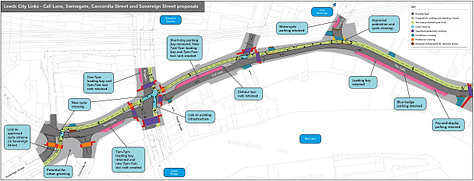
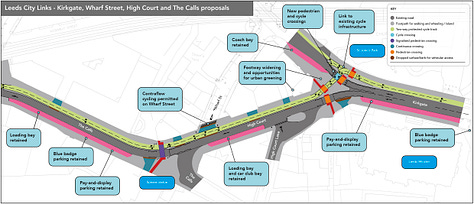


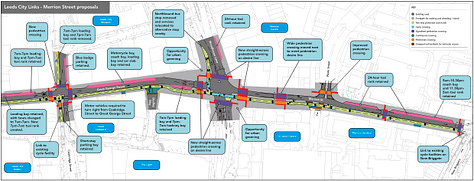

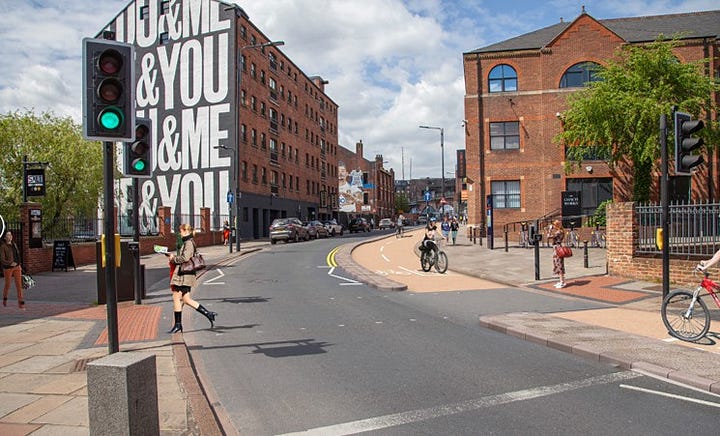
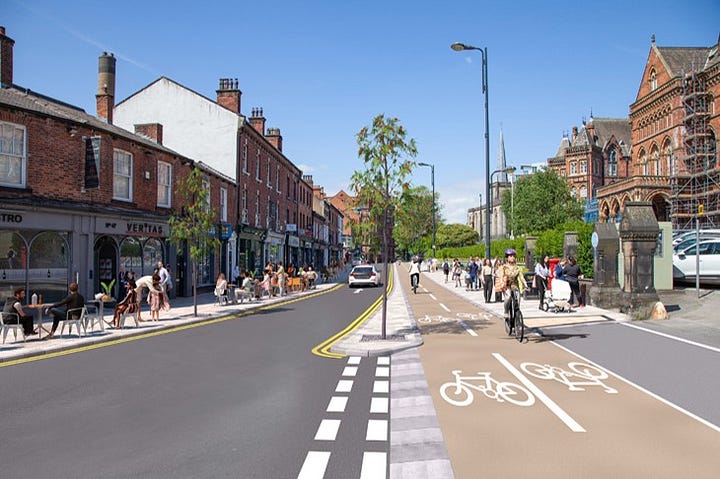
In addition to this, the West Yorkshire Combined Authority (WYCA) are consulting on plans to bring in bus franchising. WYCA sets out its case for pushing for bus franchising over an “Enhanced Partnership Plus” scheme in this document. And in all honesty, I don’t think they have made the best case that they can.
The case put forward by WYCA boils down to two things. Firstly, that while both bus franchising and the Enhanced Partnership Plus could deliver significant improvements to buses, on franchising provides a degree of control over matters such as costs and designing a future network deemed necessary by the authority. Second is this rather extraordinary point made concerning declining bus use:
….modelling outputs show that across all options, the challenge of ongoing bus patronage decline remains and would require service cuts unless further investment and / or additional policy levers are applied to significantly increase passenger demand and / or cover the cost of maintaining current service levels. Both the Proposed Franchising Scheme and the EP+ would slow this rate of decline, with the former doing this to the greatest extent and at better value for public money.
Furthermore, across all options including the EP Reference Case, the public sector will be increasingly relied on to support the bus sector over time – Franchising is identified as providing the greatest levels of control and direct influence to manage these risks.
Translation: the public sector will be supporting the future bus network anyway, so we may as well control it.
The case for change made in Greater Manchester, by contrast, played on the strategic side hard. It said “this is our vision for the future of Manchester, bus franchising fits it the best, and we have some technical analysis that shows we can make it work.” WYCA play hard on the latter, and not on the former.
You have until 7th January to help them make that strategic case stronger. So send your comments to them. This new Urban Transport Group report states that the lessons need to be learned from Manchester, so lets apply them in getting franchising over the line in Leeds!
What you can do: Fill in both surveys and provide comments. Leeds City Links can be found here, and the bus franchising consultation can be found here.
Get others to do so as well. Send it to 5 friends or family members, and ask them to complete it. If you are based in Leeds, discuss with your work colleagues and friends how important this scheme is, and encourage people to respond.
Respond how you wish, but when making your response I highly recommend the following, based on years of receiving such comments:
Start off with compliments. Say what part of the scheme you do like. Nobody likes reading abuse right out of the gate, it gets people’s back up.
Keep criticism constructive. Responses that tell people how much they suck WILL be ignored. Being passive-aggressive will get the same results. Say things like “this scheme is going in the right direction. But replacing this pavement widening with full pedestrianisation would really realise its potential.”
Be bold in your language. No could’s, only would’s. No potential, only will. Being guarded shows your intelligence. But being bold is how things change.
Link it any comments to the objectives of the relevant strategies. For Leeds City Links this is the Connecting Leeds Strategy. For bus franchising, this is the Connectivity Infrastructure Plan, Bus Service Improvement Plan, and Bus Strategy. These are driving the scheme, so explicitly link your comments to them. Few people do this, and its often the only shot at making changes at a late stage. So take that shot.
🎓 From academia
The clever clogs at our universities have published the following excellent research. Where you are unable to access the research, email the author - they may give you a copy of the research paper for free.
TL:DR - Declining water levels in major rivers could have huge impacts on spatial development.
TL:DR - Travelling in rural areas is harder on your time and your wallet.
Measuring accessibility by proximity for an inclusive city
TL:DR - Someone tests a new accessibility index based on the city of Bologna, Italy.
School choice, distance to school and travel to school patterns among adolescents
TL:DR - Less than half of school kids enrol in their closest school, with huge implications for active travel.
✊ Awesome people doing awesome things
I can’t believe that I have not done this yet, but a huge shout out to Sonya Byers and the amazing team behind Women in Transport. Every time I glance away from the work that they are doing to support, empower, and advance women in transport, I look back and they are somehow doing more.
Right now, its running an Equity Index (you and your organisation should complete it), training and support programmes, running workshops and even book clubs. All with the amazing cause of supporting women in transport. You should join them.
📻 On the Wireless
The Streets Ahead podcast has been one to listen to for a while. If you care about walking, cycling, wheeling, or better places to live more generally, you should be listening to this podcast.
But their most recent episode on disinformation in active travel is particularly good. And the first in a two-part series. Simply put, all of the disinformation playbook is being applied to fight back against liveable cities. So we must learn about it and fight it. Start by listening to this podcast.
🖼️ Graphic Design
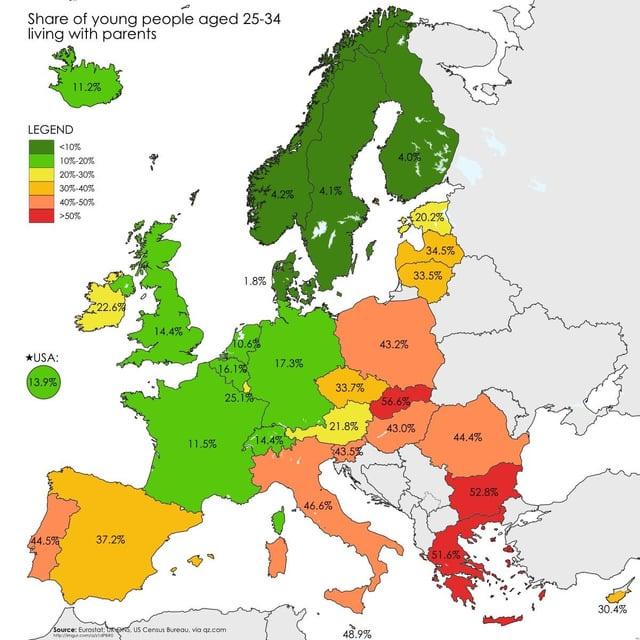
A very thought-provoking map. If the proportion of young people living at home with their parents significantly changed in the future - for economic reasons for other reasons - how would this change how people get around your area?
What you can do: If you are engaging with young people as part of transport strategies or plans for your area (you should if you are not), ask them to share their home living situation, and how it affects their life. Ask them if they hope to change this in the future, and if so what their plans are to change it. Consider that in your planning.
Want ideas on how to engage with young people? Read this article in The Conversation, or check out the work of the Future Generations Commissioner for Wales.
📚 Random things
These links are meant to make you think about the things that affect our world in transport, and not just think about transport itself. I hope that you enjoy them.
World’s largest offshore wind farm sends first power to UK grid (New Scientist)
Women take fewer risks because they think about losing more than men, research suggests (The Conversation)
If You Can Read This Headline, You Must Not Be on X (Gizmodo)
The economics of conservation in low- and middle-income countries (VoxDev)
There Are No Rules (The Atlantic)
✍️ Your feedback is essential
I want to make the calls to actions better. To do this, I need your feedback. Just fill in the 3 question survey form by clicking on the below button to provide me with quick feedback, that I can put into action. Thank you so much.


